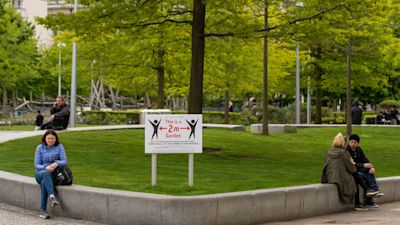Covid: Cases of Indian variant increasing in England and Scotland

Cases of the Indian coronavirus variant are increasing in England and Scotland, newly released data shows.
The Office of National Statistics' figures up to May 22 have included the Indian variant for the first time, showing it's having an effect in the UK.
It will be a cause for concern, with the plan to completely lift restrictions on June 21 potentially needing to be reconsidered if cases of the Indian variant continue to increase.
Overall, the picture is a positive one as cases across the UK remain low, as the impact of the vaccination programme is having an impact.
The percentage of people testing positive for Covid-19 is estimated to have increased in eastern England, while there were early signs of a decrease in south-east England.
The trend for all other regions was uncertain, the ONS said.
Around one in 1,120 people in private households in England had Covid-19 in the week to May 22 – broadly unchanged on one in 1,110 in the previous week, according to the latest estimates from the Office for National Statistics (ONS).
The percentage of people testing positive for coronavirus continues to be low at 0.09%, but there are potential signs of an increase since early May, when the percentage was 0.07%, the ONS said.
Listen to our coronavirus podcast.
There is both “cause for concern” and “cause for optimism” in Scotland’s battle against coronavirus, Nicola Sturgeon has said.
Speaking at the coronavirus briefing in Edinburgh on Friday, the First Minister said there still needed to be a “reasonable degree of caution” exercised.
Case numbers, she said, are on the rise in Scotland, with Friday’s daily case number the highest since March 25 and the R number in Scotland potentially rising as high as 1.3.
She said: “A key factor behind the increases… is that the new April-02 variant, which we think is more transmissible than most other types of the virus, probably now accounts for 50% or even more of our daily cases.”
She added: “The increase in cases so far does seem to be concentrated in younger age groups and this may indicate that vaccination is having a protective effect for older people which of course we want to see.”
The First Minister went on to say that the Scottish Government is monitoring the extent to which the vaccine programme is breaking the links between rising cases and “significantly rising cases of serious illness and death”.
Glasgow will remain in level 3 restrictions, she announced, but could move down to level 2 from next Saturday if trends continue.
She said case numbers in the area were still "uncomfortably high" but that "there are some early signs that the situation is stabilising".
Sarah Crofts, Head of Analytical Outputs for the Covid-19 Infection Survey, said: “Today’s figures show that while infections remain low across the UK at around 4% of the levels seen at the start of the year, there are signs of recent increases in England, Scotland and Northern Ireland.
“We have seen a rise in cases that are not compatible with the UK variant, suggesting that we may be seeing the first signs of variant B.1.617.2 in our data.
“We will continue to closely monitor infection rates as restrictions ease.”